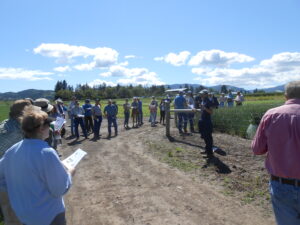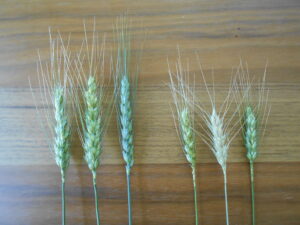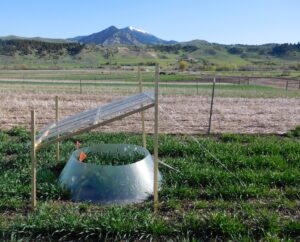Final report for MW16-004
Project Information
Agricultural sustainability depends as much on the natural resources required for production as it does on stakeholders' knowledge and decisions. While progress has been made in identifying sustainable practices and understanding the decision-making process of agricultural stakeholders, new challenges require rethinking sustainable agriculture outreach activities. Specifically, in the face of unprecedented climate change, we need to understand the variables that influence the decision-making process of agricultural stakeholders to design extension programs geared towards enhancing the long-term sustainability of their initiatives.
This proposal brings together an interdisciplinary team of experts in the areas of agro-ecology, food science, sociology, and education to develop, implement, and deliver educational material to address the effects of climate change on water-limited agricultural systems. The overall goal of this project is to understand the knowledge, needs, constraints, and perceptions of Montana agricultural producers and educators (hereafter stakeholders) related to climate change and agricultural mitigation practices. Through surveys we will fulfill or objectives of 1) identify audience perceptions, experiences, and priorities related to climate change 2) assess audience awareness of sustainable agricultural strategies to mitigate the impact of climate change. We will utilize the information obtained to 3) develop and deliver extension-based activities to advance audience environmental literacy on the effects of climate change on agricultural systems, mitigation practices, and resilience strategies to handle them. Extension activities will enhance audience's 1) awareness about the impacts of climate change on production systems and 2) ability to implement climate- resilient strategies.
- I) Identify stakeholders' perceptions, experiences, and priorities related to climate change.
- Assess stakeholders' awareness of sustainable agricultural strategies to mitigate the impact of climate
- Develop and deliver extension-based activities to advance stakeholders literacy on the effects of climate change on agricultural systems, mitigation practices, and resilience
- Evaluate participants' engagement, understanding, and awareness of climate change effects and mitigation on agricultural Evaluation methods include: observations of the workshops and data analysis of satisfaction surveys administered pre and post-intervention. Surveys will include Likert-type and open-ended questions. Findings of the evaluation will guide the revision of the extension activities.
The first two objectives will allow us to compare multiple stakeholders' (extension agents, farmers, and ranchers) knowledge, perceptions, values, practices, challenges, opportunities, and needs related to climate change and assess how these variations influence sustainable agricultural practices. This characterization is important for designing solutions such for sustainable agricultural practice and educational programs. The information generated in this project will, in turn, be used to develop effective curricula on principles and strategies regarding agricultural sustainability in the face of a change climate. Specific activities will include workshops, roundtable discussions, seminars, and technical bulletins. By taking into account the diversity of multiple stakeholders and their prior knowledge and perceptions, we hope to increase the usefulness of the information conveyed in Objective 3. Finally, we will formally evaluate the effeteness ofour educational activities and the findings will guide their revision.
Proposed timetable
Obj. 1 will be conducted in during the first ten months of this project. Activities will include: 1) prepare and distribute the survey, and 2) conduct univariate and multivariate analysis to evaluate stakeholders' perceptions, experiences, and priorities related to climate change.
Obj. 2 will also be conducted in during the first ten months of this project. Activities will include: 1) prepare and distribute the survey, and 2) conduct univariate and multivariate analysis to assess stakeholders' awareness of sustainable agricultural strategies to mitigate the impact of climate change.
Obj. 3. The extension-based activates of this proposal will be conducted after we finish the data analysis (month 10). Because we regularly coordinate and participate in extension programs across Montana and the region, we forecast that we will continue these activities beyond the length of this proposal
Obj. 4. The evaluation of outcomes will be conducted during the last two months of this project
Education
This project allowed us to better understand Montana’s agricultural stakeholders’ knowledge, attitudes, and concerns regarding climate change and climate change impacts. Our results indicated that while concerns regarding the severity and impact of climate change are shared across all sectors, acknowledging the impact that anthropogenic activities have on global climate varies across political views. This study further allowed us to identify knowledge gaps and concerns as well as socio-economical groups that share similar concerns regarding climate impact on Montana agriculture. The results allowed us to develop a technical bulletin on climate science for Montana agriculture and deliver 10 extension presentation and one webinar. Overall, we directly impacted 617 Montana’s citizens
Results are presented in the Education & Outreach section: Develop and deliver a Power Point presentation describing the implications of climate change for Montana agriculture
Education & Outreach Initiatives
Produce, publish and distribute an introductory bulleting on climate science tailored to the needs of Montana’s agricultural stakeholders
A four-page introductory bulleting on climate principles including weather and climate definition, climate forecasting, greenhouse effects, and climate change.
This technical bulleting was used as part of the extension activities (field days, growers’ meetings, and extension talks associated with this proposal)
Develop and deliver a Power Point presentation describing the implications of climate change for Montana agriculture
Power-point-WSARE-report. This 44 slide presentation 1) summarizes climate trends and projections from Montana (slides 1-11), 2) describes a field study assessing potential implications of climate change for Montana agriculture (slides 12 – 29), and 3) discuss knowledge, perceptions, and concerns of Montana’s citizens on climate change (slides 30-44). NOTE: the results of this WSARE proposal are presented and discussed in slides 30-44.
This presentation was offered at 10 growers and general public meetings across Montana for a total of 662 participants.
Produce and deliver a webinar in the Association of Natural Resources Extension Professionals Climate Science Initiative
In this webinar, we discussed how we are addressing the issue of communicating climate change and bridging the gap between citizens and scientists. As an example, we organized the dialogue based on Montana climate data and the question “Is cheatgrass becoming more difficult to manage.”
The recoded webinar can be seen at https://connect.extension.iastate.edu/p12zpqktru2/?launcher=false&fcsContent=true&pbMode=normal
Visit field studies assessing the impact of climate conditions (increased temperature and reduced moisture) on wheat yield
We conducted two field tours to visit experimental plots where we are evaluating the impact of climate conditions (increased temperature and reduced moisture) on crop growth and yield.
A total of 125 farmers and agricultural professionals visited the plots and discussed the impact of climate change on crop yield and assessed mitigations practices.


